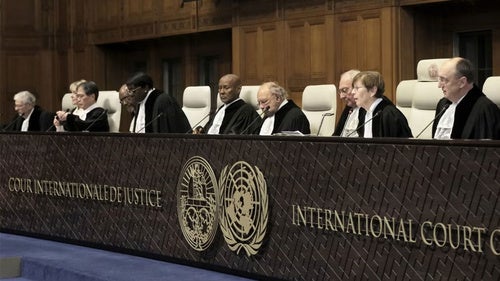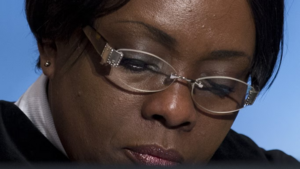ICJ Judge Voted Against Every Approved Measure in Israel Genocide Case

Julia Sebutinde of Uganda voted no on more measures in the ICJ's ruling than the judge Israel appointed to the UN court for this case.
In short: The United Nations' International Court of Justice ruled on Jan 26. that while South Africa’s genocide case against Israel is under review, Israel must "take all measures within its power to prevent and punish the direct and public incitement to commit genocide" as well as immediately allow for humanitarian assistance in the Gaza Strip. But the judges did not approve the request to stop military action in Gaza, nor did they order a cease-fire. One judge, Julia Sebutinde of Uganda, dissented on all six provisional measures the court approved, voting no on more measures than the judge Israel appointed to the ICJ for this case.
How Were Each of the Approved Measures Voted on?
Four out of six of the provisional measures that were approved passed in a 15-2 vote, with Sebutinde and Israeli-appointed judge Aharon Barak dissenting. Sebutinde was the only dissent on the other two measures, which stated that Israel must prevent and punish any incitement to commit genocide against the Palestinian people in Gaza, and that Israel must take “immediate and effective measures” to allow humanitarian aid into Gaza.
Sebutinde has served on the court during three other genocide cases. In the two of those cases in which provisional measures were asked for, Sebutinde voted in favor of them. This includes the 2022 case between Ukraine and Russia, in which she voted in favor of all three provisional measures that passed, which included demands that Russia immediately cease its military operations in Ukraine.

Judge Sebutinde at the start of hearings in a dispute between Peru and Chile over the two countries' maritime boundary at the International Court of Justice in The Hague, Monday, Dec. 3, 2012. (Photo: Peter Dejong / AP)
Why did Sebutinde Dissent on Every Measure?
Sebutinde wrote in her dissent that "the dispute is ... essentially and historically a political one” between Israel and Palestinians and should be resolved through “a diplomatic or negotiated settlement” and an “implementation in good faith” of the United Nations Security Council’s resolutions.
On Nov. 15, the Security Council passed a resolution that called for “humanitarian pauses” to allow aid into Gaza and for the immediate release of all hostages held by Hamas and other groups. On Dec. 22, the Security Council passed a resolution demanding that all parties involved “allow, facilitate and enable” the delivery of humanitarian assistance into Gaza.
Sebutinde wrote she doesn’t believe that the Israel-Hamas war, or more widely the dispute between Israel and the Palestinian people, is a legal issue “calling for judicial settlement” by the ICJ.
“Unfortunately, the failure, reluctance or inability of States to resolve political controversies such as this one through effective diplomacy or negotiations may sometimes lead them to resort to a pretextual invocation of treaties like the Genocide Convention, in a desperate bid to force a case into the context of such a treaty, in order to foster its judicial settlement: rather like the proverbial ‘Cinderella’s glass slipper,’” Sebutinde wrote in her dissent.
The judge added that she didn’t believe South Africa’s provisional measures, as requested under the U.N. genocide law, were plausible because “the acts allegedly committed by Israel were not accompanied by a genocidal intent.”
Who is Julia Sebutinde?
Sebutinde has been on the ICJ since February 2012 and is currently serving her second term. She is the first African woman to sit on the ICJ. Before joining the court, she sat on the High Court of Uganda and the Special Court of Sierra Leone.

